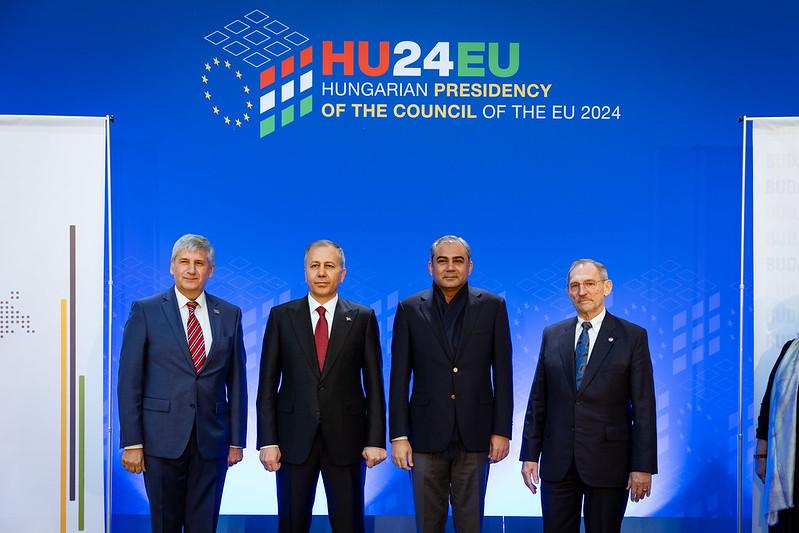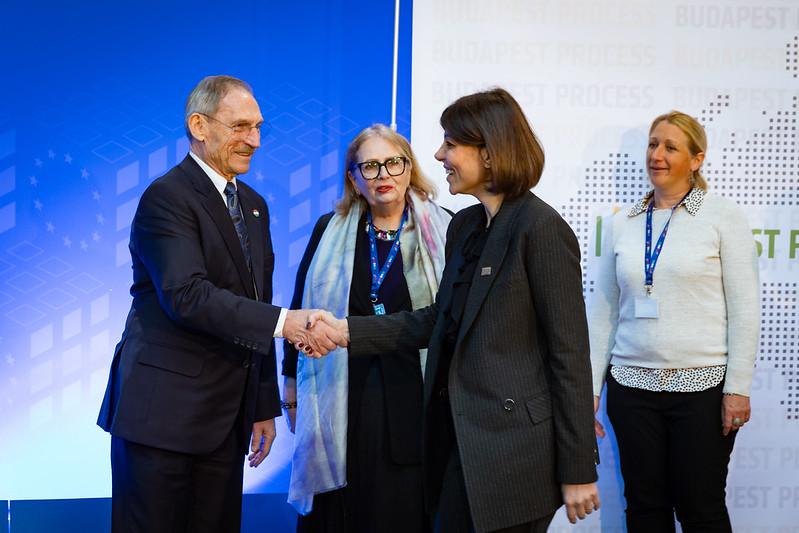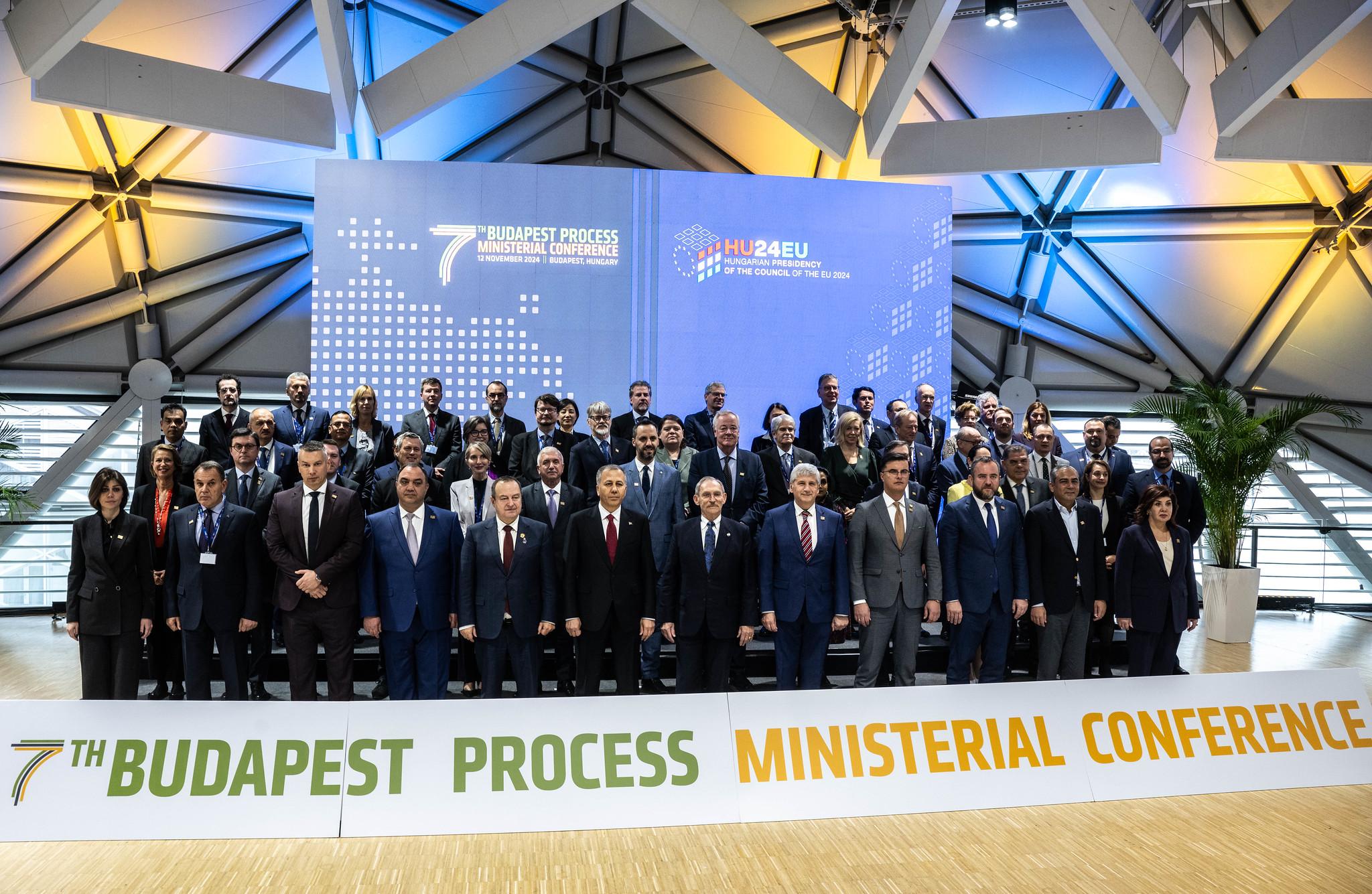On 11-12th November 2024, ministers, deputy ministers and senior officials from 50 countries and 13 international organisations convened in Budapest and agreed to a joint vision of migration governance, endorsing a new Ministerial Declaration and Call for Action. The endorsement of these texts represents a significant step toward strengthening regional cooperation on migration, with a particular emphasis on the Silk Routes Region.
The Ministerial Conference was chaired by the Hungarian Minister of Interior, Dr. Sándor Pintér, who was flanked by Ali Yerlikaya, Turkish Interior Minister, Michael Spindelegger, ICMPD Director General, and Johannes Luchner, Deputy Director General for Migration and Home Affairs at the European Commission.
Ministerial participation was notably strong, marked by the presence of ministers from the region of focus, including Evan Faeq Jabro, Iraqi Minister of Migration and Displaced and Mohsin Naqvi, Minister of Interior of Pakistan. The event was hosted by the Hungarian Presidency of the Council of the European Union, alongside ICMPD, which hosts the Budapest Process Secretariat.
“Prolonged conflicts, economic instability and climate change … have reshaped migratory flows worldwide. These dynamics create complex challenges that no single country can address alone.”
Mohsin Naqvi, Minister of Interior of Pakistan


The countries represented at the conference endorsed the Budapest Process Ministerial Declaration and its accompanying Call for Action 2025-2030. This represented a pivotal milestone for the dialogue, as these texts define the strategic direction of the Budapest Process for the upcoming five years, denoting the priority areas to be centered in future meetings and operational actions.
The priority areas endorsed at the Ministerial Conference are as follows:
- Prevent irregular migration and fight against migrant smuggling, reinforcing cooperation in border management, criminal investigations, and prosecutions.
- Strengthen pathways for legal migration and mobility, enhancing existing policies and cooperation on labour mobility.
- Strengthen international, regional, and bilateral cooperation for safe, effective, and prompt return, readmission, and sustainable reintegration.
- Strengthen the positive impact of migration on development, while addressing the root causes of irregular migration and forced displacement.
- Ensure international protection and respect of the rights of refugees and people in need of international protection, promoting durable solutions in line with international law.
- Support the integration of regular migrants, refugees, and those in need of international protection, countering racism, extremism, discrimination, and xenophobia.

The declaration also addresses the need for a whole-of-route and rights-based approach to the governance of complex migration issues – a sentiment that was shared by the participants in attendance in Budapest.
ICMPD Director General, Michael Spindelegger, reflected upon the success of the conference and his hopes for the future of the newly revitalised dialogue:
Migration will always be a demanding and complex issue. With this Joint Declaration, we renew our political commitments and realign our collective focus on priority areas for the next five years. This Declaration reflects compromise, consensus and a shared vision; acknowledges the diversity of its partners; and finds a lot of common ground between us.

Overall, the delegations present reaffirmed their support for the dialogue and its overarching goals and principles. They acknowledged the Budapest Process’ unique and enduring value in promoting cooperation and partnership amongst countries of origin, transit and destination. With the attendance of over 300 participants and more than 30 bilateral meetings held, the conference facilitated meaningful exchanges, strengthened relationships, and laid the groundwork for future collaborative efforts on migration governance.
“In these Documents, we have taken care not to leave any area of migration behind. (They) have been prepared with an integrated, multi-stakeholder, human rights-based approach.”
Ali Yerlikaya, Minister of Interior of Türkiye
Following the Ministerial Conference, the focus of the Budapest Process will now turn toward the implementation of the Call for Action 2025-2030. This will ensure that concrete, operational results emerge from a successful political dialogue, in keeping with the motto of the Budapest Process: ‘Dialogue Leading to Action’.
“The Budapest Process plays an important role as a platform for discussion and cooperation on migration management among countries of origin, transit and destination. Recognising its added value, the European Commission continues to strongly support the work of the Budapest Process.“
Mr. Johannes Luchner, Deputy Director-General, Directorate General for Migration and Home Affairs, European Commission
Further publications on the Budapest Process 7th Ministerial Conference
Commission welcomes the Budapest Process Ministerial Declaration to renew cooperation on migration – European Commission
7th Ministerial Conference of the Budapest Process
Hungary: Federal Minister for Interior Mohsin Naqvi in a group photo with delegates from 7th Ministerial Conference – Ministry of Interior
